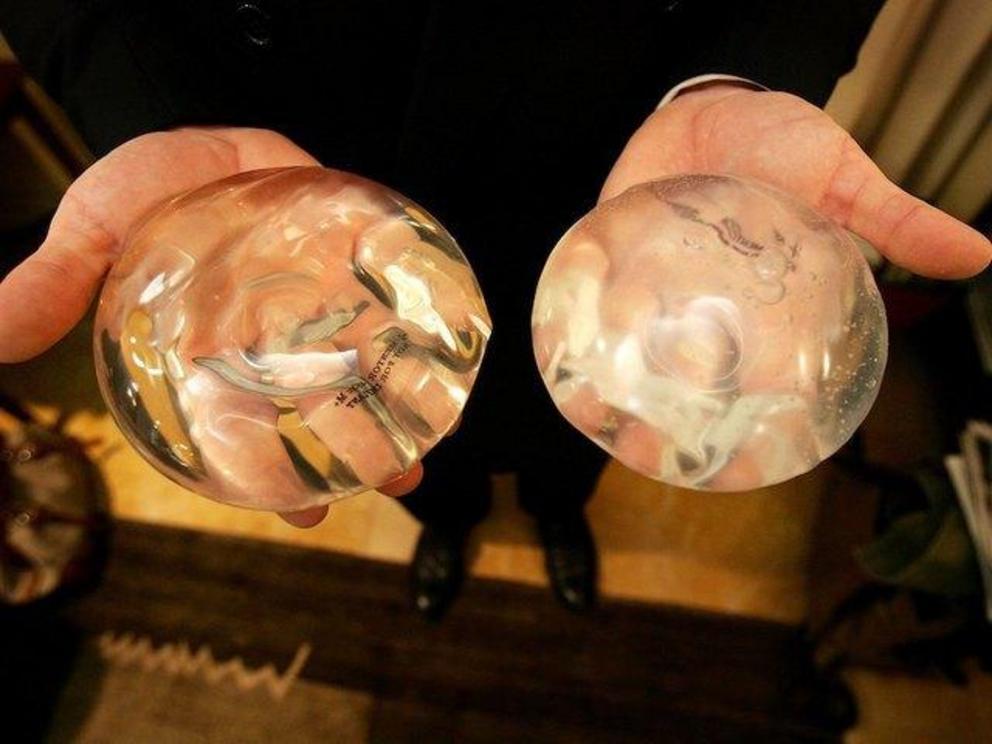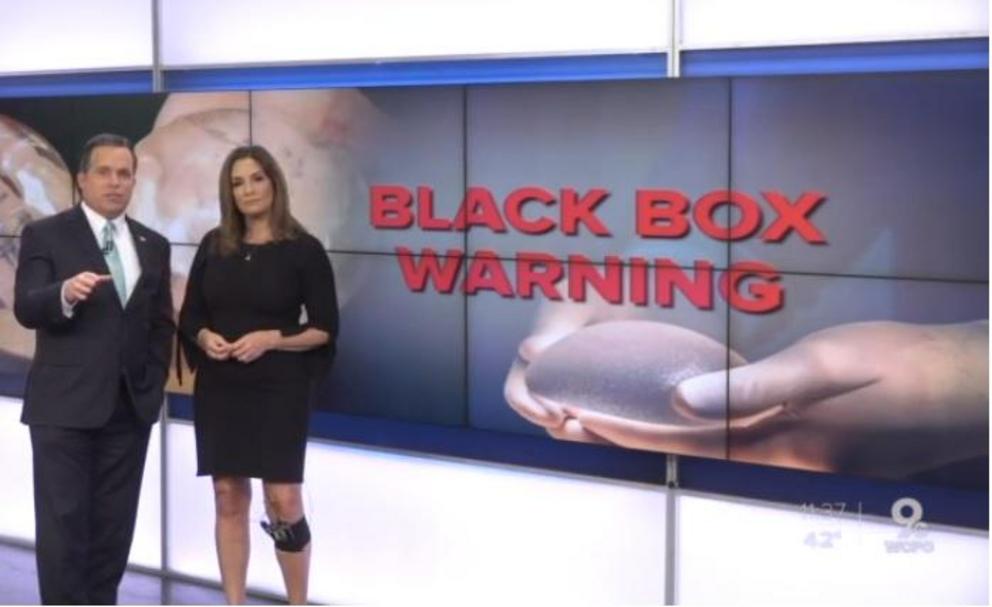FDA considers black box warning for all breast implants
A rash and joint pain may have saved Lily McBreen's life by getting her to the doctor in time for a breast cancer diagnosis. Although many other survivors choose implants after their mastectomies, she's adamant that she won't. Having almost lost her life once, she's worried the side effects of receiving breast implants could endanger it again.
“After breast cancer your biggest motivation is to survive and you know that to survive you have to become healthy and whole again," she said. "So the idea of putting something in your body that’s potentially going to make you sick again is something you’re not going to be willing, or want to do."
McBreen was diagnosed with fibromyalgia a few years ago. When she noticed rash and joint swelling in her wrists, she went to her doctor, who sent her to a rheumatologist to perform a full body scan. That’s when she saw it: a lump inside her breast. She was diagnosed with stage two breast cancer.
“I just started spinning mentally," said McBreen, a registered nurse. "I really honestly can’t verbalize. I just started bawling."
She started chemo within a week of the diagnosis and had her last round on her birthday in November.
“That’s either a gift or not a gift,” she said.
That was followed by a bilateral mastectomy a month later. Then came another big decision: Should she get breast implants?
“By now, I heard people tell plenty of just anecdotal accounts of implant syndrome,” she said.
It’s why she elected to instead have a flap surgery, which uses the patient's own tissue to reconstruct the breast.
“I wanted to avoid the rheumatological symptoms that have been out in the news for so many decades," she said. "There has been so many accounts of women complaining of problems with them."
Those symptoms, which women are calling “breast implant illness,” are among the many reasons the United States Food and Drug Administration could soon take extreme measures when it comes to educating the public about implants.
 Lily McBreen was diagnosed with stage two breast cancer in 2017.
Lily McBreen was diagnosed with stage two breast cancer in 2017.
FDA investigates breast implants
In March 2019, at an FDA conference about breast implants, women, doctors and surgeons shared harrowing stories of complications connected to receiving implants after a mastectomy.
“I experienced extreme exhaustion, rapid weight gain, paralyzing brain fog,” Julie Elliot testified.
“I was completely bedridden, waiting to die,” said Terry Diaz, who described herself as a breast implant survivor. “I couldn’t even walk up a flight of stairs.”
The women said their implants caused these issues. Others experienced an even more serious complication: A rare form of cancer called breast implant-associated anaplastic large cell lymphoma, or BIA-ALCL, in which lymphoma develops in the tissue around the implant.
“Life as I knew it ceased to exist,” Terry McGregor, a BIA-ALCL survivor, told the FDA panel. “Four years ago, I was diagnosed with ALCL from breast implants that were six years old. My diagnosis was stage four. The joy of life was cut short by a profit-driven, man-made cancer."
The FDA released more findings about BIA-ALCL in July, months after the conference. According to U.S. and global medical device reports, there have been 573 reports of BIA-ALCL. Thirty-three patients died.
Of those cases, the FDA said a majority are linked to a single pharmaceutical manufacturer, Allergan, and its textured BIOCELL implants. The company recalled the implants on July 24.
“Patient safety is a priority for Allergan," the company said in a news release announcing the recall. "Patients are advised to speak with their plastic surgeon about the risks and benefits of their implant type should they have any concerns.”
In October, the FDA proposed adding a black box warning to all breast implants warning patients about the potential side effects of breast implant illness and BIA-ALCL.
 Dr. Brad Jacobs holds up a silicone implant gel (L) and a saline implant gel (R) inside of his office November 21, 2006 in New York City.
Dr. Brad Jacobs holds up a silicone implant gel (L) and a saline implant gel (R) inside of his office November 21, 2006 in New York City.
Women file class-action lawsuit against Allergan
By January 2020, women from 37 different states had signed onto a class-action lawsuit against Allergan, including one woman from Ohio and another from Kentucky.
The lawsuit, which was filed by Berger Montague PC, Sauder Schelkopf LLC and Mazie Slater Katz and Freeman LLC, accuses the company of negligence and claims it knowingly withheld information that the recalled implants were linked to cancer.
The lawsuit seeks to cover the cost associated with removing and replacing the patients' implants.
As part of the recall, Allergan said in a press release that the company would “provide Allergan smooth device replacements for free … As part of this program, Allergan will not provide surgical fee assistance to revision patients.”
“Our clients and the many women who have contacted us should not have to deal with the anxiety of living with a recalled breast implant," said plaintiffs’ attorneys Joe Sauder and Matt Schelkopf. "We look forward to fighting on their behalf in seeking a resolution that provides them with peace of mind.”
In a statement to WCPO, the company said it has followed FDA regulations and acted transparently: “Allergan has a demonstrated history of dedication to the health and safety of patients and a strong record of compliance with U.S. Food and Drug Administration (FDA) regulations and requirements. Allergan has followed FDA regulatory reporting procedures and acted transparently with patients about textured breast implants.
"We paid close attention to reports of a link between textured breast implants and BIA-ALCL, shared reports of patient complaints with regulators, and worked with the FDA to determine that a BIOCELL textured implant product recall was an appropriate step. We’ve worked hard to keep patients and surgeons informed about the recall and continue to encourage a full dialogue between patients and their doctors about the benefits and risks of breast implants."
Doctors say implants are safe, for the most part
Several doctors in our region told WCPO that breast implants are safe — for the most part.
“Breast implants are one of the most-studied medical tools because we’ve had so many of them for so long,” said Dr. Neil Kundu, chief of plastic surgery at Mercy Health. “The real key is to make sure that there’s a good dialogue and expectations and understanding are made.”
Kundu said that when discussing BIA-ALCL, the numbers need to be put into context.
“We’ve had hundreds and thousands of breast implants," he said. "And these implants have been in for decades, and of the hundreds of thousands of implants, the FDA has only seen 530 some unique cases of this ALCL."
Kundu also noted that he rarely uses textured implants, which are most commonly linked to ALCL. Still, a handful of his patients have come in to have their implants removed because of the recent news.
“I’ve had three patients that I’ve removed implants on for concern of this," he said. Kundu explained that the numbers aren't higher "because not every patient needs to have them removed."
He believes the black box warning is key for education, which is necessary for anyone choosing to undergo a surgery.
“Breast implants are safe,” he said. "The most important thing is education, and before having any procedure, or any implanted device go into your body, you should have a thorough understanding of what the device does and the risk and benefits of every device that you have.”
University of Cincinnati assistant professor of plastic surgery Ryan Gobble echoed that sentiment.
“I think the idea is more transparency is better," he said. "And that making sure patients know that there are real risks associated with using implants."
As for women specifically choosing implants after surviving breast cancer, Mercy Health breast surgical oncologist Amy Moldem said the decision — and discussion — should be no different.
“I think we would offer the same implants, whether or not it’s an augmentation versus a reconstruction,” she said. “I think the important thing is that we educate them. We can educate them that there is a black box warning when we do their consent but also relay that fact that this disease has never been associated with the implants that we’re going to use.”
For the rest of this article please go to source link below.
Video can be accessed at source link below.

